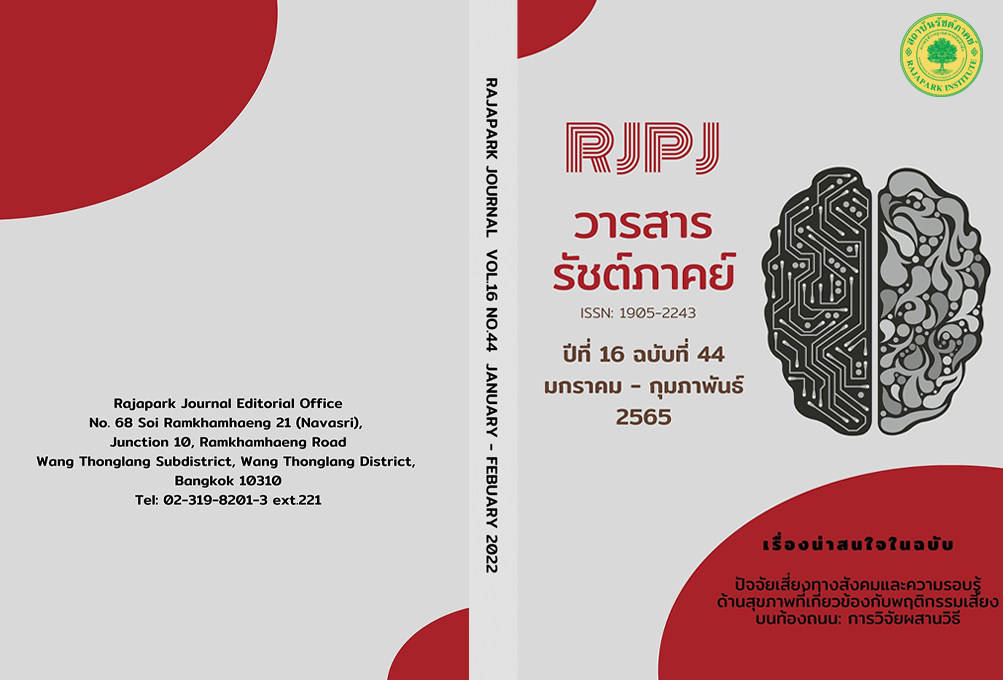Regulation of Automated Vehicles under the Vehicles Act B.E. 2522 (1979)
Main Article Content
Abstract
This research aimed to study (i) legal measures to be applied with self-driving cars; (ii) definition or interpretation of self-driving cars; (iii) an appropriate registration requirement for self-driving cars (iv) conditions to determine the qualifications of the driver for self-driving cars (v) suitable insurance for self-driving cars; and (vi) legal requirements and conditions for self-driving cars after the permission to use or test has been granted. This is qualitative research contributed by reviewing the laws, regulations, and regulatory framework on self-driving cars of the United Kingdom and Singapore to analyze the material elements in the legislation process of the law in another country. The study is to demonstrate and present problematic issues, solutions, improvements, or additional procurement to the law in Thailand. According to the study, it was identified that (i) there is no regulatory requirement currently applied to self-driving cars; (ii) there is no legal interpretation for a self-driving car under Thai law; (iii) self-driving cars cannot be registered for a daily-use in Thailand; (iv) the existing qualifications for driver do not apply for self-driving cars; and (v) self-driving cars cannot be insured under car insurance in Thailand.
Article Details

This work is licensed under a Creative Commons Attribution-NonCommercial-NoDerivatives 4.0 International License.
Views and opinions appearing in the Journal it is the responsibility of the author of the article, and does not constitute the view and responsibility of the editorial team.
References
Baker Mckenzie. (2018). Global Driverless Vehicle Survey 2018. Retrieved December 29, 2020, from https://www.bakermckenzie.com/-/media/files/insight/publications/2018/03/global-driverless-vehicle-survey-2018/mm_global_driverlessvehiclesurvey2018_mar2018.pdf
Butr-indr, B. (2020). Legal Challenges in the IOTs: Case Study of Smart Car’s Liability. Bangkok: Thammasat University.
Chaimongkol, C. (2017). Director of the New Generation, Clear Strategy. OSHE Magazine. Retrieved May 12, 2021, from http://164.115.27.97/digital/files/original/5415e708f29c5c824929e8124fa23c03.pdf
CNA. (2017). Regulations in Place to Ramp up Driverless Vehicle Trials in Singapore. Retrieved October 25, 2020, from http://www.channelnewsasia.com/news/singapore/regulations-in-place-to-ramp-up-driverlessvehicle-trials-in-sin-7622038
Digital Economy Promotion Agency [DEPA]. (2017). Tech Series: Electric and Autonomous Cars. Retrieved September 1, 2021, from https://www.depa.or.th/th/article-view/tech-series- electric-and-autonomous-cars
Keeratipranon, N. (2011). Unmanned Ground Vehicle(Research report). Bangkok: Dhurakij Pundit University.
Publications Office of the European Union. (2018). A Common EU Approach to Liability Rules and Insurance for Connected and Autonomous Vehicles. Retrieved May 1, 2021, from https://op.europa.eu/en/publication-detail/-/publication/df658667-20f1-11e8-ac73- 01aa75ed71a1/language-en
Road Traffic Act, 2017 (Chapter 276). Road Traffic (Autonomous Motor Vehicles) Rules 2017. Singapore Statutes Online. Retrieved March 29, 2021, from https://sso.agc.gov.sg /SL/RTA1961-S464-2017?DocDate=20170823
UK Parliament. (2017). Automated and Electric vehicles Bill. Retrieved May 1, 2021, from https://publications.parliament.uk/pa/bills/cbill/2017-2019/0112/18112.pdf
UK Parliament. (2018). Automated and Electronic Vehicles Act 2018. Retrieved September 10, 2021, from https://commonslibrary.parliament.uk/research-briefings/cbp-8118/
Vehicle Act, B.E. 2522(1979) (1979, May 12). Government Gazette. Volume 96 Chapter 77 Special Issue, pp.22.


